
Reading is a market town and borough in Berkshire, England. Located in the Thames Valley at the confluence of the rivers Thames and Kennet. Reading is 40 miles (64 km) east of Swindon, 24 miles (39 km) south of Oxford, 40 miles (64 km) west of London and 16 miles (26 km) north of Basingstoke.

Reading Abbey is a large, ruined abbey in the centre of the town of Reading, in the English county of Berkshire. It was founded by Henry I in 1121 "for the salvation of my soul, and the souls of King William, my father, and of King William, my brother, and Queen Maud, my wife, and all my ancestors and successors." In its heyday the abbey was one of Europe's largest royal monasteries. The traditions of the Abbey are continued today by the neighbouring St James's Church, which is partly built using stones of the Abbey ruins.

Berkshire is a historic county in South East England. One of the home counties, Berkshire was recognised by Queen Elizabeth II as the Royal County of Berkshire in 1957 because of the presence of Windsor Castle, and letters patent were issued in 1974. Berkshire is a county of historic origin, a ceremonial county and a non-metropolitan county without a county council. The county town is Reading.
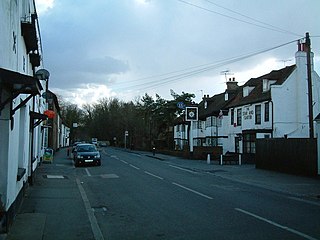
Colnbrook is a village in the Slough district in Berkshire, England. It lies within the historic boundaries of Buckinghamshire, and straddles two distributaries of the Colne, the Colne Brook and Wraysbury River. These two streams have their confluence just to the southeast of the village. Colnbrook is centred 3 miles (4.8 km) southeast of Slough town centre, 3.5 miles (5.6 km) east of Windsor, and 19 miles (31 km) west of central London.

A public library is a library that is accessible by the general public and is usually funded from public sources, such as taxes. It is operated by librarians and library paraprofessionals, who are also civil servants.

Wokingham is a market town in Berkshire, England, 37 miles (60 km) west of London, 7 miles (11 km) southeast of Reading, 8 miles (13 km) north of Camberley and 4 miles (6 km) west of Bracknell.

The Borough of Wokingham is a local government district in Berkshire, United Kingdom. It is named after its main town, Wokingham. Other places in the district include Arborfield, Barkham, Charvil, Earley, Finchampstead, Hurst, Sonning, Remenham, Ruscombe, Shinfield, Twyford, Wargrave, Three Mile Cross, Winnersh, Spencers Wood and Woodley. The population of Wokingham is 177,500 according to 2021 census.

The Council of the Royal County of Berkshire, also known as the Berkshire County Council, was the top-tier local government administrative body for Berkshire from 1889 to 1998. The local authority had responsibilities for education, social services, public transport, planning, emergency services and waste disposal, and had 87 members. Berkshire County Council shared power with six lower-tier district councils, each of which directed local matters.

Southcote is a suburb of Reading in the English county of Berkshire. Located to the south-west of Reading town centre, Southcote has a population of about 8,500. The settlement lies primarily between the London-to-Bath road and the River Kennet.
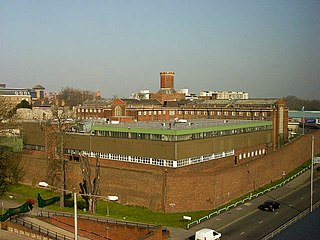
HM Prison Reading, popularly known as Reading Gaol, is a former prison located in Reading, Berkshire, England. The prison was operated by His Majesty's Prison Service until its closure at the start of 2014. It is a Grade II listed building and sits on the site of Reading Abbey.

The Public Libraries Act 1850 was an Act of the United Kingdom Parliament which first gave local boroughs the power to establish free public libraries. The Act was the first legislative step in the creation of an enduring national institution that provides universal free access to information and literature, and was indicative of the moral, social and educative concerns of the time. The legacy of the Act can be followed through subsequent legislation that built on and expanded the powers granted in 1850 and the 4,145 public libraries that exist in the United Kingdom in the 21st century can trace their origins back to this Act.
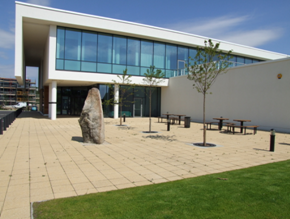
The Wiltshire and Swindon History Centre in Chippenham, Wiltshire, England, serves as a focal point for heritage services relating to Wiltshire and Swindon. The centre opened in 2007 and is funded by Wiltshire Council and Swindon Borough Council. It has purpose-built archive storage and research facilities and incorporates the local studies library, museums service, archaeology service, Wiltshire buildings record and the conservation service.

Reading Town Hall is the town hall of Reading, Berkshire, England. The town hall was built in several phases between 1786 and 1897, although the principal facade was designed by Alfred Waterhouse in 1875. Situated close to the site of Reading Abbey, it is adjoined to the north by the Hospitium of St John and to the south by St Laurence's Church.
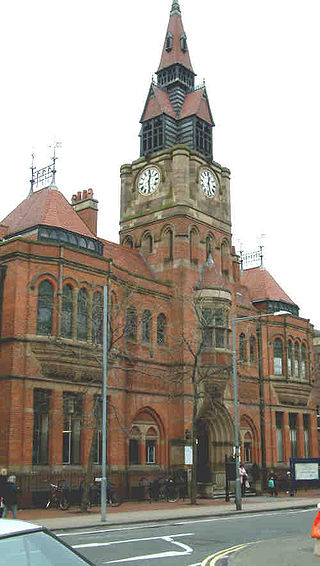
Derby Central Library was the main public and reference library in Derby, England, between 1879 and 2018. It was established in 1879 along with Derby Museum and Art Gallery, with which it shared a red brick building designed in the Domestic Flemish Gothic style by Richard Knill Freeman and given to Derby by Michael Thomas Bass. It was formerly the largest branch of Derby City Libraries run by Derby City Council.
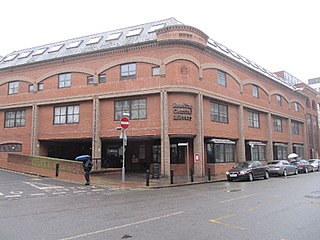
Reading Central Library is a public library in the town of Reading, in the English county of Berkshire.
Occupation at the site of Reading may date back to the Roman period, possibly as either a trading port on the River Thames, or as an intersection on the Roman road connecting London with Calleva Atrebatum near Silchester.
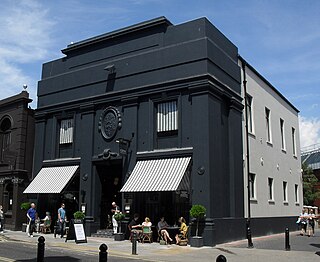
The English coastal city of Brighton and Hove has a long and varied history of libraries going back over 250 years. Subscription libraries were among the earliest buildings in the resort of Brighton, which developed in the late 18th century; by the 1780s these facilities, which were more like social clubs than conventional book-borrowing venues, were at the heart of the town's social scene. The Brighton Literary Society, its successor the Brighton Royal Literary and Scientific Institution and its rival the Sussex Scientific Institution between them established a "very fine collection" of publications by the mid-19th century, and these books were donated to the town when a public library was founded in 1871. Neighbouring Hove, originally a separate village, established its own public library in 1890.

Rawtenstall Library is a Carnegie Library located in the town of Rawtenstall, Lancashire.

The following is a timeline of the history of Reading, the county town of Berkshire in England.

The Westland District Library is the public library in Hokitika, on the West Coast of New Zealand. Beginning as the Hokitika Literary Society in 1866, it occupied a Carnegie library building from 1908 as the Hokitika Free Public Library, moving out in 1975.

















